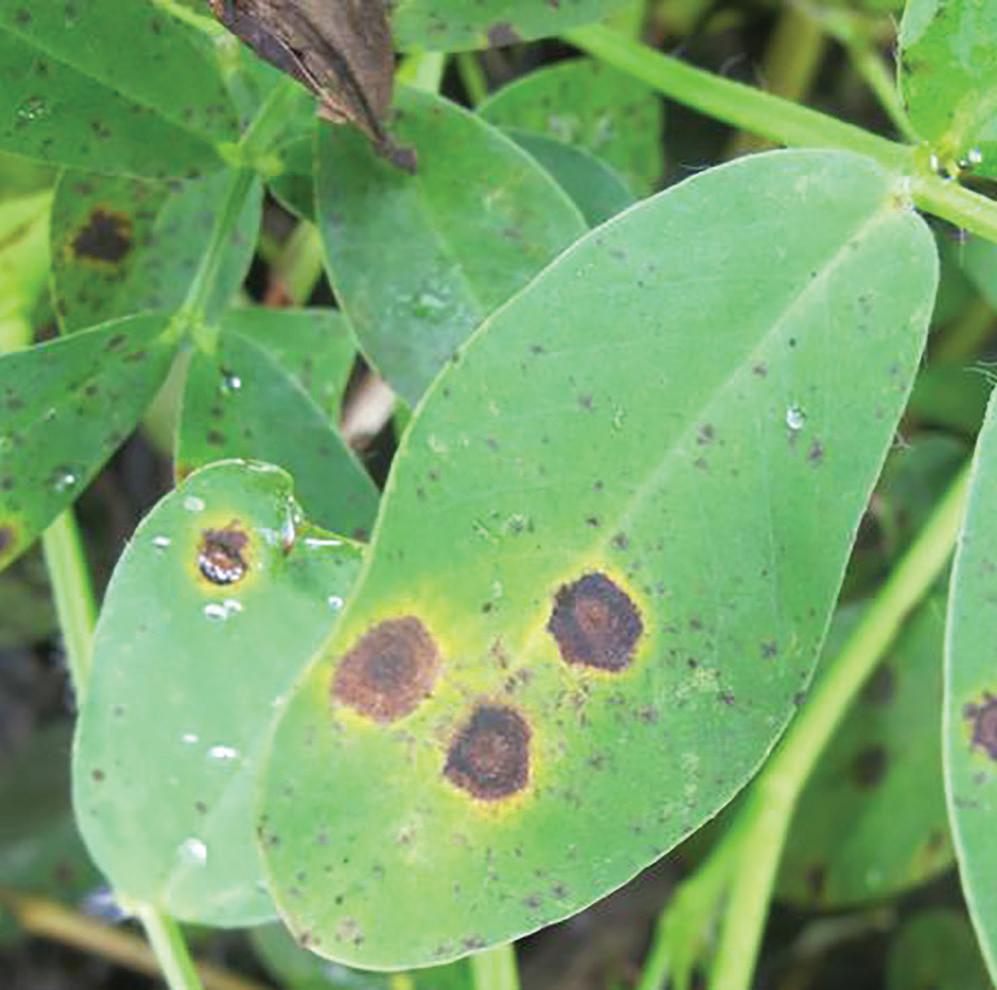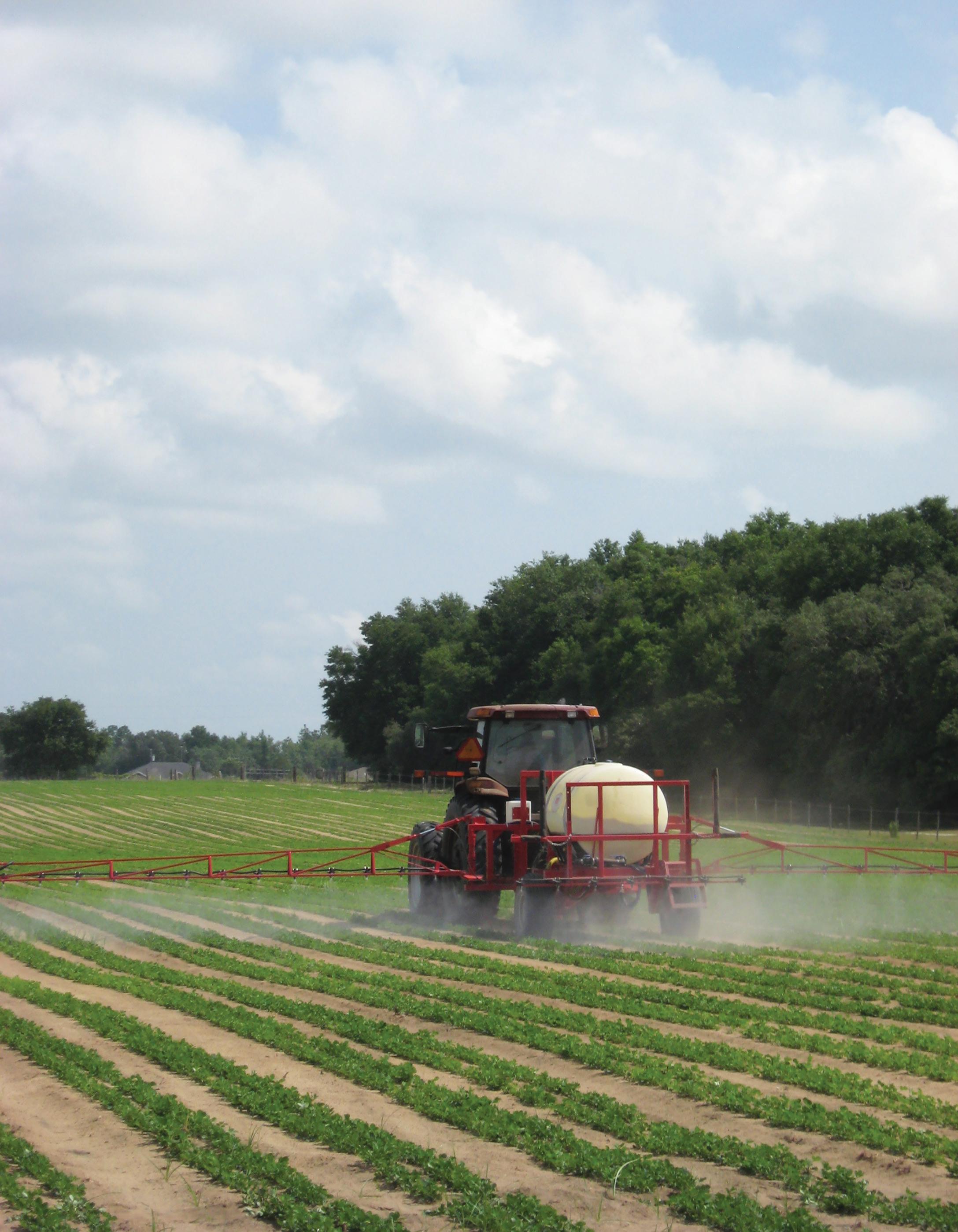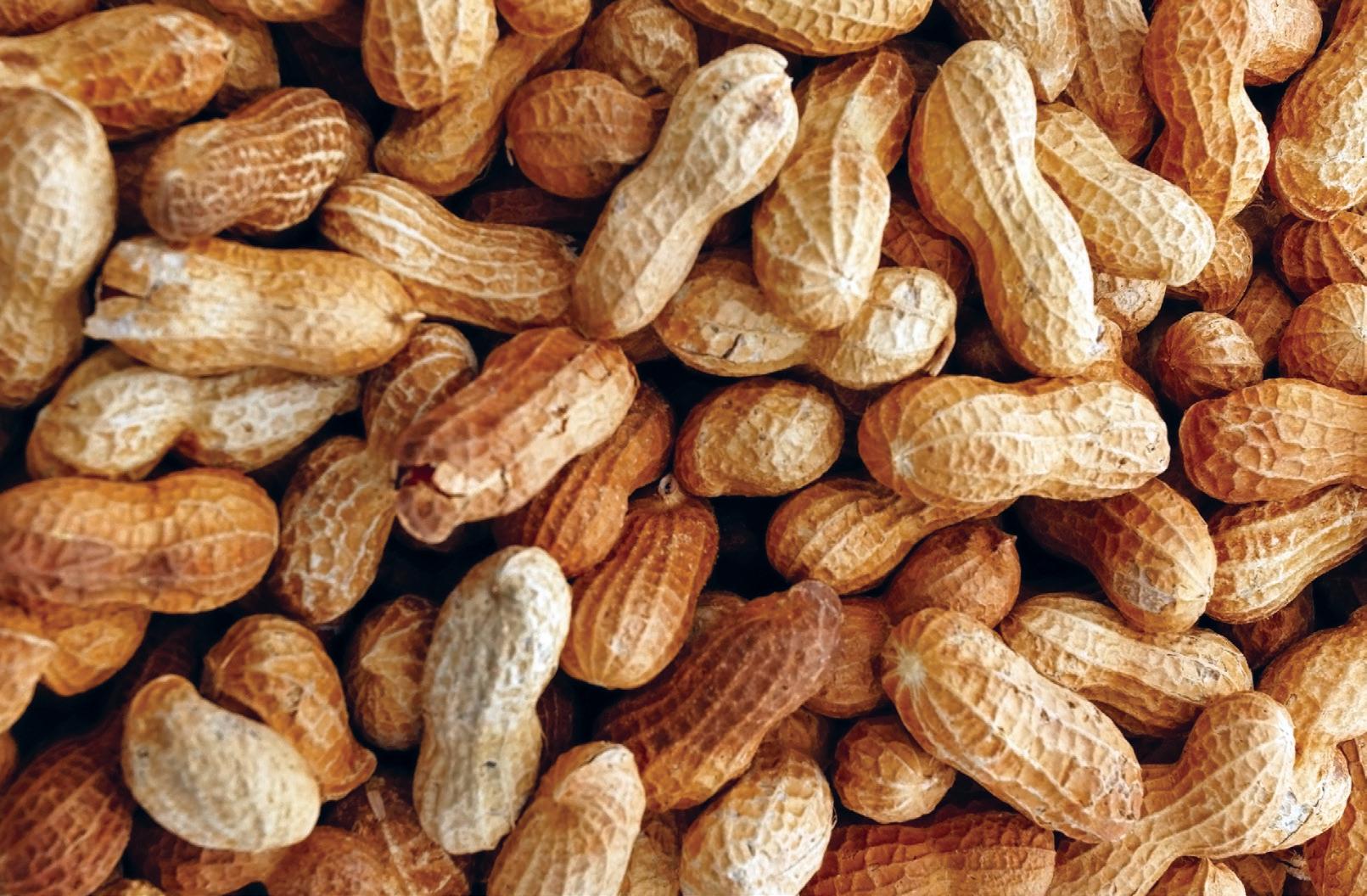
7 minute read
Peanut Pointers
Pointers


Never Leave Peanuts Unprotected
July brings a series of decisions that are generally associated with disease management. While herbicides will need to be applied in some fields and there could be outbreaks of foliar-feeding insects (hopefully not spider mites), the key to optimizing yield will be timely applications of DAVID JORDAN effective fungicides. Starting
North Carolina State fungicide sprays at the R3
University Extension Agronomist stage of peanut development is the general recommendation in the Virginia-Carolina region. With the exception of fungicide programs that include Miravis with either Elatus or Convoy for stem rot control, applying fungicides every two weeks, as long as conditions are favorable for pathogens, is critical.
When weather is not favorable for leaf spot to develop, which can be determined using local weather-based advisories, stretching out the days between sprays can reduce expenses and minimize the likelihood of spider mite outbreaks without sacrificing leaf spot control.
Never leave peanuts unprotected when conditions are favorable for pathogen development and incidence of disease. When fungicides are applied in a timely manner and in a way that should keep peanuts protected, remember to select the correct fungicide to do the job at hand. With leaf spot resistance present for several fungicide sites of action, making sure effective fungicides or mixtures of fungicides are applied can make all the difference. Check with your local Extension agent or specialist to know what levels of resistance might be present in your area and formulate a fungicide program accordingly.
In July, Apogee or Kudos is applied. These products prevent internode elongation and minimize growth. Two applications are generally needed. The first goes out at 50% row closure where half of the vines from adjacent rows are touching. The follow-up spray goes out two to three weeks later depending upon regrowth and weather conditions. Don’t be early on the first spray, and make sure nitrogen is included with the application.
While increases in yield and grade can be inconsistent, there are more intangible benefits to using these products. Digging can be easier when rows are more clearly defined, and as peanut plants move through the digger, there is less loss of pods. Vines invert more easily and stay in windows (falling over) more often when these products are applied, especially for peanut varieties that have a vigorous growth

habit, also considered rank growth.
Much of what happens in July and August is setting us up for flexibility and efficiency in digging and harvesting peanut. Actions now determine the flexibility you will have in September and October. Increased flexibility means greater ability to optimize yield and financial return, especially with the unpredictable nature of weather.
Apply Fungicides Preventatively
Disease and insect management will be important as we move into the second half of the growing season. It is highly encouraged to scout fields on a weekly basis even if you believe you are in the good fungicide program. We observed mite infestations in several fields in the west Texas during 2019 growing EMI KIMURA season. Although it is not a common issue, environmenTexas A&M AgriLife Extension Peanut Specialist tal conditions were favorable for mite populations. Without careful scouting of fields, such problems can be easily ignored. They will reduce yield potential if they are not treated immediately.
In the Southwest, the common diseases affecting peanuts are the pod rots, leaf spot and Sclerotinia blight. Research compared fungicide applications between preventative calendar-based applications 60 to 70 days after planting and
Pointers
after the disease symptom observation for a curative treatment. The result showed that preventative fungicide applications were more effective than curative applications of fungicide on Sclerotinia blight and pod rot disease complex. This approach will be effective for managing foliar diseases.
Minimize e Impact Of Disease
The 2020 production season has been a roller coaster ride for the first 60 days. Growers have had a difficult time establishing stands because of cooler than normal temperatures during late April and early May, as well as having to deal with seed quality issues throughout the planting season. The good news
SCOTT MONFORT is that the crop has turned the
University of Georgia Extension Agronomist corner and looks good across most of Georgia. Based on the information from our climatologist, Pam Knox, the weather is predicted to be warmer and potentially wetter than normal. She also notes that humidity levels could be higher, especially at night. Although everyone

hopes the rain continues, the higher than normal temperatures and moisture/humidity can lead to an increase in disease pressure. With this in mind, disease management needs to remain on the minds of growers for the rest of the year.
There are several things growers can do to minimize the impact of diseases and other pests on their crop’s yield potential. The number one thing is to have a scout in your fields weekly. A good scout will keep you informed when a pest problem develops, thus allowing you a chance to make changes to your management tactics before it costs you a loss in yield potential.
Secondly, effectively managing diseases in peanut is dependent on the fungicide program you choose to use on your farm. Growers in Georgia have the advantage of having quite a few fungicides to choose from. Understandably, growers often select the base, or cheaper, fungicide programs in an effort to save money. The problem in disease-prone years is that the base fungicide programs may not be as effective as more expensive, premium programs, thus leaving money on the table and yield in the field.
Pointers
This does not mean a grower needs to utilize the most expensive fungicide program.
In the end, growers need to have an understanding of the historic disease pressure on their farm, have someone scouting their crop, and put together the most effective and economical fungicide program that fits his/her needs.
Peanut Rx should be a helpful tool in this endeavor. The Peanut Rx can be found at uga peanutteam.org, and do not hesitate to contact your local Extension agent for help.
Check Fields For Calcium
I know many of you had some seed issues this planting season. The cooler temperatures in April and May worsened that problem. Thankfully, not everyone had
KRIS BALKCOM stand problems.
Auburn University Extension Specialist But for those who did, hopefully we have minimized the problem as best we can by patching in a few more seeds or completely replanting those fields.
Just remember, by harvest those plants may not be as far apart in age as you would think since those first ones were so slow because of the cooler weather. I encourage you to not give up on them even though they aren’t perfect or what you expected to have this year. I have seen those type stands still make very well. Continue to keep them clean and free from weeds.
Many of you are reluctant to use higher-end fungicides, but it is worth the money and will give the return. They are essential in combating disease.
Also, be sure to check the calcium values across your fields and remember that gypsum is applied to dryland fields rather than lime. The reason for this is that we may not get enough rain on dryland fields to make calcium from lime available to the plant compared to irrigated fields where we are frequently watering.
Keep scouting and concentrate on making a respectable yield.


KRIS BALKCOM
GEORGIA Albany (800) 780-7401 Ashburn (229) 567-9661 Donalsonville (800) 738-8229 Statesboro (877) 489-8763 Sycamore (800) 277-1121 Sylvester (229) 776-5514 FLORIDA Groveland (877) 724-8787 Plant City (813) 704-5470 Venus (866) 893-7848 Williston (352) 215-0834 MISSISSIPPI Aberdeen (662) 369-2733 Bolton (601) 866-9394 Calhoun City (662) 637-2600 Greenwood (662) 455-8900 Hollandale (662) 807-6200 Rolling Fork (662) 907-3030 Valley Park (601) 218-8007 NORTH CAROLINA Aberdeen (910) 944-7878 Edenton (252) 482-2090 Fairmont (910) 535-8047 Greensboro (336) 621-0381 Kinston (800) 326-0743 Linwood (336) 242-6043 Williamston (252) 792-3627 Wilson (252) 291-6007 Windsor (252) 794-4117

Enhances Pegging and Pod Set Improves Grade and Quality Stimulates Plants Immune System Field Proven and University Tested










